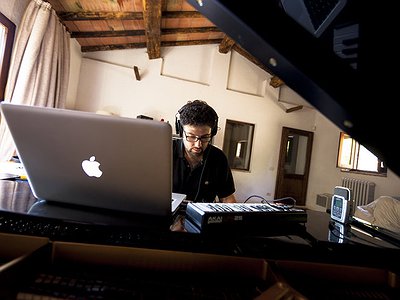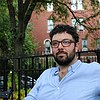Name: Christopher Cerrone
Nationality: American
Occupation: Composer
Recommendations: The most meaningful work of art that I’ve experienced recently is a piece called "The Visitors" by Ragnar Kjartansson. It’s a 9-channel video installation in which the viewer can walk around and see different musicians performing a long piece of music that Kjartansson composed based on lines from his ex-wife’s diary. I saw the piece in London, travelling between Rome and New York and the experience of being a lonely traveler seeing the work in the halls of the Barbican was extremely moving. The piece is quite long—probably about 30 minutes for the full loop to happen, and the effect is both private and public, plangent yet playful, and repetitive without ever being redundant—all things I hope to achieve in my work.
Website / Contact: If you enjoyed this interview with Christopher Cerrone, visit his official website for news, music and insights.
When did you start composing - and what or who were your early passions and influences?
I started studying classical piano at the age of 5, but my youth was dominated by alternative rock like Nirvana and Radiohead—the soundtrack of 90’s American suburbia—and electronic music like Björk and Aphex Twin. Around the age of 17, after seeing the movie "A Clockwork Orange", I worked my way backwards from Wendy Carlos’s electronic re-imaginings of Beethoven to actual Beethoven symphonies and became obsessed. Suddenly the notion of composing long scale works for classical instruments and orchestras was the only thing that interested me.
At that point I enrolled at the Manhattan School of Music in New York and discovered much of the music that continues to influence me—the minimalism of Reich, Glass, and Adams; Stravinsky; the spectralism of Grisey; and the New York School, particularly Feldman and Cage.
Later, all the music of my youth which I’d shut away 17 filtered back in, as I became comfortable with loving all the influences in my life equally.
For most artists, originality is first preceded by a phase of learning and, often, emulating others. What was this like for you? How would you describe your own development as an artist and the transition towards your own voice? What is the the relationship between copying, learning and your own creativity?
There’s a great moment in "The World According to Garp" by John Irving where the young narrator discovers an Austrian writer named Franz Grillparzer whom he just absolutely despises, and this hatred inspires him to become a writer. Garp’s idea was that he was not yet able to do something good himself, but the first step towards making something of his own is identifying with a degree of objectivity why he does not like Grillparzer.
There’s a lot of truth in that story for me: When you’re 18, you know what’s not good, but you don’t know how to make something good. But at least you’re smart enough know what you’re doing isn’t good.
At some point, I wrote a piece called “Requiem For KV”,a setting of a short Kurt Vonnegut poem. I wrote it by recording myself singing a melody after reading Vonnegut’s poem quoted in his own obituary. From then on, I started discovering the kind of music I wanted to write—stark, melancholy, repetitive, and overtly emotional.
What were some of the most important creative challenges when starting out as a composer and how have they changed over time?
The challenge of being a young composer is getting anything on the page that is half decent—not to mention getting it performed half-decently. I’m lucky that I’ve found collaborators—singers, conductors, instrumentalists, and fellow composers who have generously championed my work. When I speak to young composers, I suggest they study at a music program with lots of great performers, because the experience of being around great players at a young age and learning from them is by far the best lesson a young composer can have.
Staring my second year in college, I started producing concerts with an ensemble called Red Light New Music, who put on some of the first public performances of my work outside a university context. I continue to be a member of another composer’s collective, Sleeping Giant.
Now, at age 34, I feel that I have written quite a bit of good music! The challenge now feels like writing music of greater depth, rather than repeating things I’ve already done or relying on formulas that I know work.
Tell us about your studio/work space, please. What were criteria when setting it up and how does this environment influence the creative process? How important, relatively speaking, are factors like mood, ergonomics, haptics and technology for you?
I can usually work anywhere, but at the moment I’m sitting in a borrowed apartment in Los Angeles to escape the New York winter.
I love the word haptics! Touch is so important to me. Most of my pieces start with the physicality of the instrument I’m writing for. I’ve half-learned the flute, cello, percussion, and violin in the process of writing for these instruments, and more often than not the germinal idea comes with an instrument in my hands.
From there, I record myself playing, then transform it in a million ways on my computer using Logic before transferring it again into notated music. I’ve been using a computer since I was 5, and technology plays a really integral role in my work.
Could you take us through a day in your life, from a possible morning routine through to your work? Do you have a fixed schedule? How do music and other aspects of your life feed back into each other - do you separate them or instead try to make them blend seamlessly?
Each day I wake up and make the first of four cups of obsessively-prepared pour-over coffees (26 grams of coffee to 16 fl oz of water). On a good day, I can take an hour to focus to read fiction or poetry, or anything that is not the news. On a bad day, I read the news. I usually get to composing shortly after, until at some point other things like emails or meetings take over. I’m fairly sacrosanct about my mornings, as most of my best work takes place then.
I haven’t had a separate studio for work except when I’m at residencies, and I’ve actually found that that can be really healthy—unfortunately the realities of New York real estate seem to dictate that I work at home.
There are many descriptions of the ideal state of mind for being creative. What is it like for you? What supports this ideal state of mind and what are distractions? Are there strategies to enter into this state more easily?
Sometimes I think the best state of mind is actually some kind of focused distraction; something that will cycle the ears on and off to get a constantly renewed state of freshness.
In that way, I’m a stereotypical millennial. If I showed you a screenshot of my computer right now it has a series of text messages, a Logic project containing my new violin concerto, my email, and this interview—which I’m working on to avoid composing!
Could you take me through the process of composing on the basis of one of your pieces that's particularly dear to you, please? Where did the ideas come from, how were they transformed in your mind, what did you start with and how do you refine these beginnings into the finished work of art?
My piece "Memory Palace" was formative of the methodology I use today. It was commissioned by a group of percussionists with one request: since the commissioners did not all own the same instruments, I needed to write a piece only using found objects the players could easily acquire or make themselves.
I was unable to use my former methods of composing—playing the piano or even imagining sounds in my head, since they didn’t exist yet. Instead, I went to the studio of the percussionist Owen Weaver, and recorded him playing every instrument he owned.
At home, I slowly assembled each movement, mixing electronic sounds I’d synthesized, field recordings I’d made, and thousands of pitch-shifted copies of those different sounds, and transformed them. This kind of working is intensely collaborative, and most pieces I write these days mix this method with constant meetings,, tossing ideas back and forth between composer and performer.



